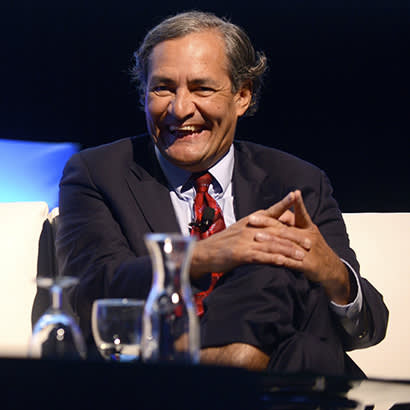
For an enhanced digital experience, read this story in the ezine.
A fierce champion of social justice and defender of parks and recreation
“I am a civil rights attorney. I have represented people on Death Row, helped free Geronimo Pratt, the former Black Panther leader, from prison after 27 years for a crime he did not commit, prosecuted public corruption and international drug trafficking conspiracies and litigated international banking cases against Iran,” said Robert García in a 2014 bio for KCET TV in Los Angeles. Despite all his civil rights accomplishments, however, García believed that one of his most hard-fought and enduring legacies was to bring access to parks and recreation for people who had none. “Fighting for the simple joys of playing in the park and school field for children of color and low-income children is the hardest work I have ever done,” he said.
Robert García, who died on April 6, 2020, after a long struggle with cancer, was the founding director of and counsel for The City Project, a nonprofit environmental justice and civil rights organization based in Los Angeles, and a champion for access to parks and recreation opportunities for low-income and communities of color. García was an ardent and outspoken defender of public parks and recreation. He had an unflinching and uncompromising belief in equality for all, a lack of tolerance for government bureaucrats who he thought were less than committed to principles, and a genuine belief that parks and recreation were a civil right as important as any other. These beliefs coupled with his unparalelled legal knowledge enabled him to win victories protecting parks and creating recreation opportunities for low-income and communities of color that few ever thought were achievable.
García delivered the keynote address at the 2014 NRPA Annual Conference in Charlotte, North Carolina, and became an NRPA board member from 2016 to 2017. He was a frequent contributor of insightful articles and thoughtful essays to Parks & Recreation magazine for many years.
“Robert was a pioneer in the Green Justice movement,” says Mark Magaña, founding president and CEO of GreenLatinos. “He constantly fought for the rights of communities that had no access to parks and recreation. At a time when there were few victories, Robert would win.” Magaña says that García’s experience as an attorney enabled him to apply successful strategies he had learned in his civil rights work. “He would devise the strategy, research the data, build the campaign and mobilize communities. He was a relentless fighter. He saved and protected places for people who did not have access to local parks and recreation areas.”
In 2001, García was instrumental in representing the communities along the Los Angeles River in their fight to prevent large warehouses being built along the river, taking away most of the green open space in the community and further separating people from the river. García’s bold appeal to Andrew Cuomo, then Secretary of the U.S. Department of Housing and Urban Development (HUD), caused HUD to withhold funding for the project until a full environmental review was completed. Upon completion of the review, which considered the impact a warehouse development would have on low-income and communities of color, the no-build alternative of using the land as a park was selected in favor of the warehouse development. Secretary Cuomo cited Title VI of the Civil Rights Act in his decision, affirming that access to local parks and recreation opportunities was a civil right.
State Senator Kevin de León on March 15, 2014, at the dedication of the Los Angeles State Historic Park on the Los Angeles River, said, “The community stopped the industrial warehouses to create the park in the most park poor city in the nation....Deservedly, their action is renowned as one of the most significant environmental justice victories in Los Angeles, and is the catalyst for the revitalization of the Los Angeles River.” García’s genuine warmth and fierce advocacy for parks and recreation will be deeply missed.
Richard J. Dolesh is an Editor at Large for Parks & Recreation magazine.

